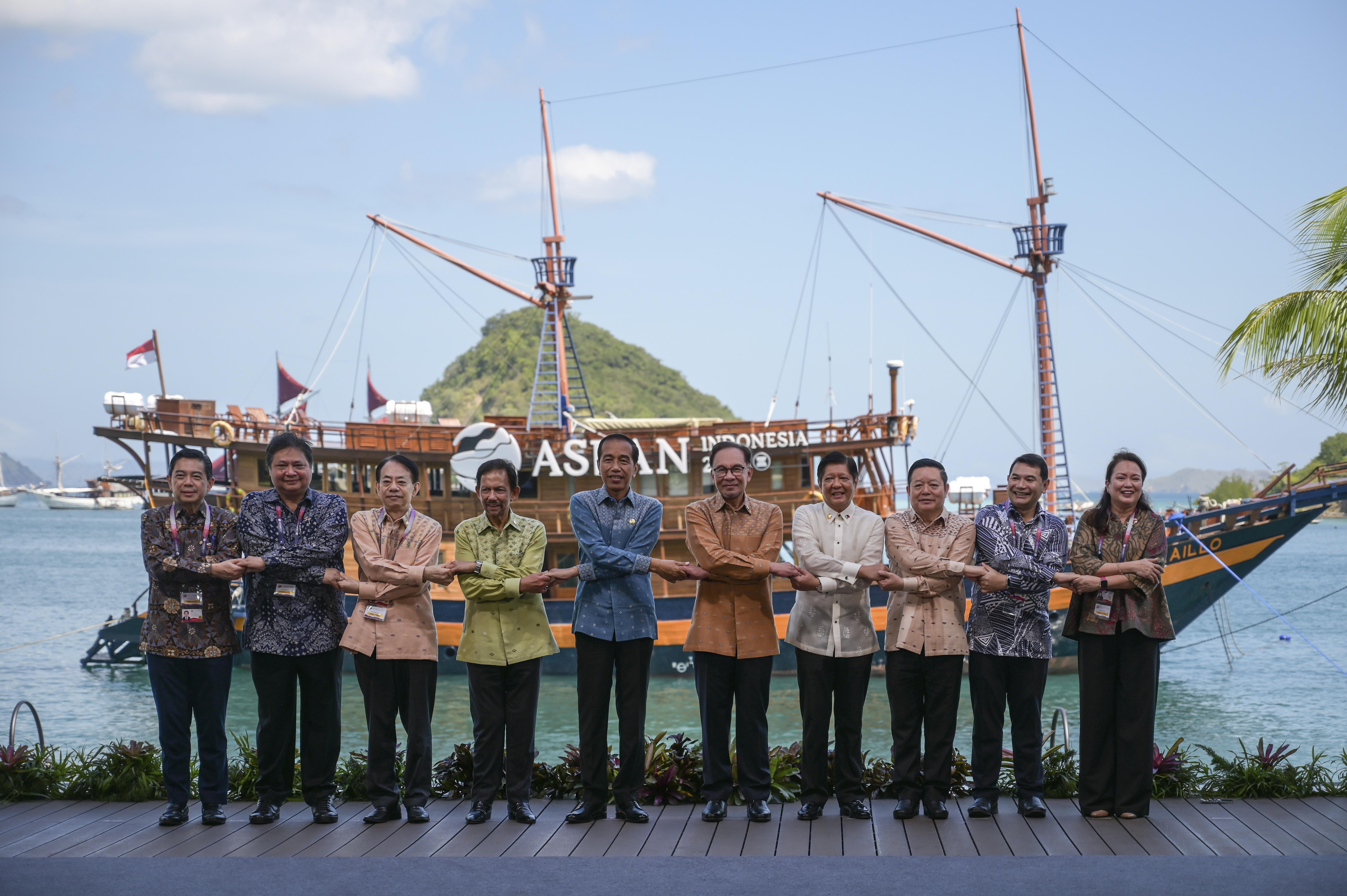 (from left) Brunei's Minister of Finance and Economy Amin Liew Abdullah, Indonesia's Coordinating Minister for Economic Affairs Airlangga Hartarto, President of Asian Development Bank (ADB) Masatsugu Asakawa, Brunei's Sultan Hassanal Bolkiah, Indonesia's President Joko Widodo, Malaysia's Prime Minister Anwar Ibrahim, Philippine's President Ferdinand Marcos Jr., ASEAN Secretary-General Kao Kim Hourn, Malaysia's Minister of Economy Rafizi Ramli and Philippines Mindanao Development Authority (MinDA) Secretary Maria Belen Acosta hold hands as they pose for a photo during Brunei-Indonesia-Malaysia-Philippines East ASEAN Growth Area (BIMP-EAGA) summit on the sidelines of the 42nd ASEAN Summit in Labuan Bajo, East Nusa Tenggara province, Indonesia, May 11, 2023. (PHOTO / AP)
(from left) Brunei's Minister of Finance and Economy Amin Liew Abdullah, Indonesia's Coordinating Minister for Economic Affairs Airlangga Hartarto, President of Asian Development Bank (ADB) Masatsugu Asakawa, Brunei's Sultan Hassanal Bolkiah, Indonesia's President Joko Widodo, Malaysia's Prime Minister Anwar Ibrahim, Philippine's President Ferdinand Marcos Jr., ASEAN Secretary-General Kao Kim Hourn, Malaysia's Minister of Economy Rafizi Ramli and Philippines Mindanao Development Authority (MinDA) Secretary Maria Belen Acosta hold hands as they pose for a photo during Brunei-Indonesia-Malaysia-Philippines East ASEAN Growth Area (BIMP-EAGA) summit on the sidelines of the 42nd ASEAN Summit in Labuan Bajo, East Nusa Tenggara province, Indonesia, May 11, 2023. (PHOTO / AP)
LABUAN BAJO – To facilitate regional economic integration, leaders of the Association of Southeast Asian Nations (ASEAN) made a declaration on advancing regional payment connectivity and promoting local currency transaction on Wednesday during the two-day ASEAN Summit.
Ajib Hamdani, head of Apindo's Economic Policy Analyst Committee, said in an official statement that de-dollarization has become a global phenomenon and, to some extent, an economic orientation
This year's 42nd ASEAN Summit under Indonesia's chairmanship is themed "ASEAN Matters: Epicentrum of Growth," held from May 9 to 11 in the Indonesian town of Labuan Bajo.
ALSO READ: Centrality, growth highlighted as ASEAN Summit opens
The declaration said leaders recognized the potential benefits of local currency usage in strengthening financial resilience, deepening regional financial integration by improving intra-ASEAN trade and investment, and bolstering regional value chains.
Leaders declared to commit to advancing regional payment connectivity by utilizing emerging opportunities brought by innovation to facilitate seamless and secure cross-border payment, taking country circumstances into consideration.
ALSO READ: ASEAN leaders confident in region being 'epicentrum of growth'
They also agreed to encourage the use of local currencies for cross-border transactions in the region and support the establishment of a Task Force to explore the development of an ASEAN Local Currency Transaction Framework.
Ahead of the summit, the Indonesian Employers Association (Apindo) had expected that Indonesia could drive regional de-dollarization through its 2023 ASEAN chairmanship.
Ajib Hamdani, head of Apindo's Economic Policy Analyst Committee, said in an official statement that de-dollarization has become a global phenomenon and, to some extent, an economic orientation.
READ MORE: ASEAN leaders call for unity
At the end of March, the ASEAN finance ministers and central bank governors meeting agreed to reinforce the use of local currencies in the region and reduce reliance on major international currencies for cross-border trade and investment in an effort to ensure financial stability and avoid spillovers such as high inflation from the global crisis.